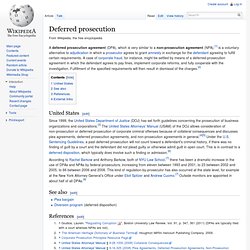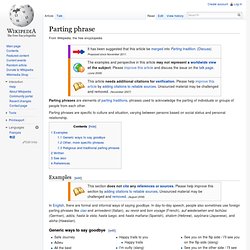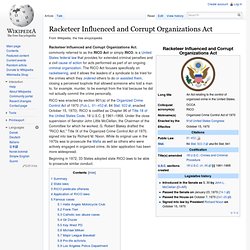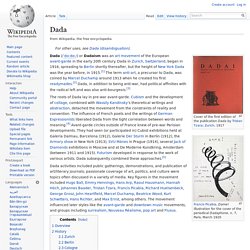

Deferred prosecution. A deferred prosecution agreement (DPA), which is very similar to a non-prosecution agreement (NPA),[1] is a voluntary alternative to adjudication in which a prosecutor agrees to grant amnesty in exchange for the defendant agreeing to fulfill certain requirements.

A case of corporate fraud, for instance, might be settled by means of a deferred-prosecution agreement in which the defendant agrees to pay fines, implement corporate reforms, and fully cooperate with the investigation. Fulfillment of the specified requirements will then result in dismissal of the charges.[2] United States[edit] According to Rachel Barkow and Anthony Barkow, both of NYU Law School,[7] there has been a dramatic increase in the use of DPAs and NPAs by federal prosecutors, increasing from eleven between 1993 and 2001, to 23 between 2002 and 2005, to 66 between 2006 and 2008.
See also[edit] References[edit] External links[edit] Regulating the 'new regulators': current trends in deferred prosecution agreements. Parting phrase. Parting phrases are elements of parting traditions, phrases used to acknowledge the parting of individuals or groups of people from each other.

Parting phrases are specific to culture and situation, varying between persons based on social status and personal relationship. Examples[edit] In English, there are formal and informal ways of saying goodbye. In day-to-day speech, people also sometimes use foreign parting phrases like ciao and arrivederci (Italian), au revoir and bon voyage (French), auf wiedersehen and tschüss (German), adiós, hasta la vista, hasta luego, and hasta mañana (Spanish), shalom (Hebrew), sayōnara (Japanese), and aloha (Hawaiian).
Generic ways to say goodbye[edit] Other, more specific phrases[edit] Religious and traditional parting phrases[edit] Some phrases, such as "Live long and prosper," "May the Force be with you," and "I'll be back" are taken from films. Organized crime. 20th century American mobster Al Capone, a figure often associated with the topic of organized crime. Other organizations—including states, militaries, police forces, and corporations—may sometimes use organized crime methods to conduct their business, but their powers derive from their status as formal social institutions. Racketeer Influenced and Corrupt Organizations Act.
Racketeer Influenced and Corrupt Organizations Act, commonly referred to as the RICO Act or simply RICO, is a United States federal law that provides for extended criminal penalties and a civil cause of action for acts performed as part of an ongoing criminal organization.

The RICO Act focuses specifically on racketeering, and it allows the leaders of a syndicate to be tried for the crimes which they ordered others to do or assisted them, closing a perceived loophole that allowed someone who told a man to, for example, murder, to be exempt from the trial because he did not actually commit the crime personally. RICO was enacted by section 901(a) of the Organized Crime Control Act of 1970 (Pub.L. 91–452, 84 Stat. 922, enacted October 15, 1970). RICO is codified as Chapter 96 of Title 18 of the United States Code, 18 U.S.C. § 1961–1968. Under the close supervision of Senator John Little McClellan, the Chairman of the Committee for which he worked, G.
Summary[edit] When the U.S. Dada. Dada (/ˈdɑːdɑː/) or Dadaism was an art movement of the European avant-garde in the early 20th century.

Dada in Zurich, Switzerland, began in 1916, spreading to Berlin shortly thereafter, but the height of New York Dada was the year before, in 1915.[1] The term anti-art, a precursor to Dada, was coined by Marcel Duchamp around 1913 when he created his first readymades.[2] Dada, in addition to being anti-war, had political affinities with the radical left and was also anti-bourgeois.[3] Francis Picabia, Dame! Illustration for the cover of the periodical Dadaphone, n. 7, Paris, March 1920 Overview[edit] Francis Picabia, (left) Le saint des saints c'est de moi qu'il s'agit dans ce portrait, 1 July 1915; (center) Portrait d'une jeune fille americaine dans l'état de nudité, 5 July 1915: (right) J'ai vu et c'est de toi qu'il s'agit, De Zayas! Dada was an informal international movement, with participants in Europe and North America.